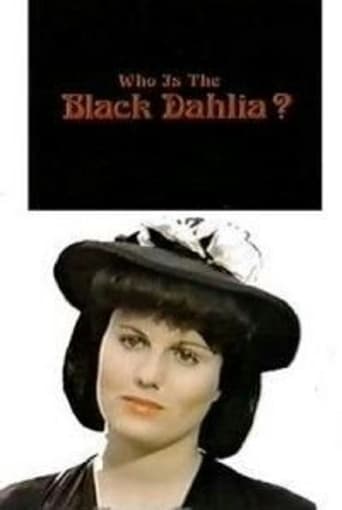jeff-hertel
I watched the film when it was first broadcast and I remember actually being really frightened by it. It was the eerie, atmospheric setting of the movie and good acting that gave the movie it's frightening aspects not the gore and carnage that movies made today depend on. Also, after watching her for years in "The Lucy Show" it was a very pleasant surprise to see Lucy Arnez playing a sexy young woman. Her acting career was really hampered by being the daughter of the famous woman. I wish that the film would be shown again on a cable telvision channel such as TCM or AMC so I could tape it. The recent big screen movie version of "The Black Dahlia" was a major disappointment especially compared to this well done made-for-television version.
Lechuguilla
"This is about a murder that really happened. Nobody made it up. As far as I know, there's never been another one before or since, quite like it --- ever!" Those ominous words, spoken in VO by Efrem Zimbalist, Jr., open this 1975 docudrama that chronicles a real life murder mystery that has never been solved.Elizabeth Short moved to California in the 1940's, in search of show-biz stardom. The fact that this beautiful young woman wore mostly black clothes to match her black hair led others to nickname her "The Black Dahlia". On January 15, 1947, her mutilated and exsanguinated body was found in a vacant field in Los Angeles. The homicide immediately created national interest. And in the fifty-plus years since her death, this unsolved murder has evolved into a major legend.The screenplay for "Who Is The Black Dahlia?" is factual, well written, sensitive, and thankfully low-key. The story, told in flashbacks, is riveting. In one chilling scene, a man stands in a telephone booth and, with his back to the camera, conveys to the newsman on the other end of the line crucial details about the murder that only the killer could know. The man's face is never shown.Playing the role of Elizabeth Short, Lucie Arnaz gives a credible and sympathetic performance. Efrem Zimbalist, Jr. convincingly plays Sgt. Harry Hansen, the frustrated, lead detective. The support cast is equally effective. The film's music is appropriately downbeat and depressing.Some viewers may find the plot to be slow. Certainly, the film's lack of in-your-face violence and gore will disappoint the tabloid crowd. But for thinking people, for viewers who can appreciate a thoughtful and insightful analysis of a horrible crime, I recommend this film most highly.In the film's final VO, Sgt. Hansen reflects: "We never found anybody who saw Elizabeth Short the last six days of her life ... In Los Angeles police files, The Black Dahlia murder case is still open."
bigpurplebear-1
**Warning: Possible spoilers for anyone unfamiliar with the story!**The grisly murder of Elizabeth Short -- the "Black Dahlia" -- has fascinated crime-buffs (along with ghouls of various stripe) virtually nonstop since that January 1947 morning when her savaged body was discovered in a south-central L.A. vacant lot. Almost immediately, and almost without exception, this focus has been sensationalized and has tended to dehumanize Short to such an extent that it's all too easy to overlook the fact that she was a human being as opposed to merely a gaudily-nicknamed, conveniently placed puzzle.The great exception to this treatment is 1975's "Who Is The Black Dahlia?"The film tells two stories in parallel, and it does so very effectively. Alongside the police investigation into her murder, Beth Short's life is also examined in flashback as months and days unfold to lead her to her death. There's a sense of inevitability in the air that surrounds both stories; just as certain initial steps (or missteps) in the investigation seem to foredoom its chances of success, there is likewise an aura of "paths not taken" which seems to render the Black Dahlia's fate inescapable. As portrayed (hauntingly and convincingly) by Luci Arnaz, Short emerges as a vulnerable young woman who, for all her outward cynicism, is far too trusting. In the film's final glimpse of Beth, as you watch her walking away into infamy, you may well experience an urge to run after her, stop her, maybe buy her a cup of coffee, anything to forestall the inevitable . ..And that final glimpse leads to the "side mystery" I alluded to in the title line. Police reports filed during the initial investigation indicate that Short was last seen walking south from the Hotel Biltmore, and yet in the film -- for which retired LAPD Sgt. Harry Hansen provided copious notes from his days (and official files) on that investigation -- she's depicted as walking west along 7th Street from the Hotel Mayfair. Curious . ..Along with Arnaz (whose mother, Lucille Ball, was reportedly dead-set against her playing the role), the movie offers standout performances by Efrem Zimbalist Jr. (as Hansen), Tom Bosley (as longtime, and well-known, police reporter Bevo Means) and a very well-designed sense of time and place to heighten the authenticity in a strong film.
ActorMan22
I too was frightened the first time I saw this TV movie. It tells the story of the short life, and gruesome, unsolved 1947 murder of Elizabeth Short, whose nickname was the Black Dahlia, a type of flower. There is a certain creepiness that pervades this low-key period story, told in flashbacks of Short's brief Los Angeles existence before her slaughter. Efram Zimbalist, Jr., portrays the detective who becomes obsessed with the young, attractive woman's story. The period details feel right, for I am too young to have any first-hand experience of the time, and Lucie Arnaz's performance as the doomed title character adds emotional weight to what could have been an exploitive picture. This is another example of how superior, in general, '70's made-for-television movies were to future endeavors.


